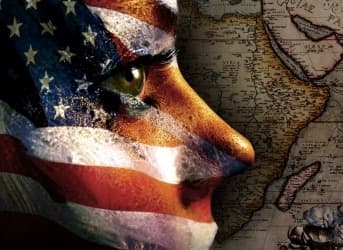For the last decade, as China has advanced its economic interests on the Dark Continent, Washington regarded Africa primarily through its ‘global war on terror” lens.
Top of the U.S. agenda was combating terrorism. After World War II, the US military carved up the globe outside its borders into a series of Unified Combatant Commands (UCC) to project military power and safeguard interests abroad. In 2008 the Pentagon’s fifth UCC was established, when the United States Africa Command (AFRICOM) became operational.
Except for Egypt, which remains under CENTCOM administration, AFRICOM is responsible for overseeing US military operations and relations across the whole African continent and the island nations of Cape Verde, Sao Tome and Principe, the Comoros, Madagascar, Mauritius and the Seychelles. Prior to the establishment of AFRICOM, responsibility for continental Africa was divided between European Command (EUCOM) and Central Command (CENTCOM), while Pacific Command (PACOM) had responsibility for Madagascar, the Comoros and Mauritius.
AFRICOM was established to strengthen "security cooperation with Africa and creating opportunities to bolster the capabilities of our partners in Africa. Africa Command will enhance our efforts to bring peace and security to the people of Africa and promote our common goals of development, health, education, democracy, and economic growth in Africa," but AFRICOM’s first deployment was last year’s campaign to oust Muammar Gaddafi.
No more – Washington has belatedly discovered Africa’s vast mineralogical and energy riches, and the U.S. State Department is dispatching a trade mission to Africa that will visit Mozambique, Tanzania, Nigeria and Ghana.
Why?
By 2013, African oil production is projected to grow to 10.7-11.4 million barrels per day (bpd), and by 2018 to 12.4-14.5 million bpd. The U.S. is currently Nigeria's biggest oil importer, and the National Intelligence Council further projects that U.S. oil imports from the Gulf of Guinea will increase to more than 25 percent of all U.S. imports by 2015, a mere three years away.
The delegation’s mission?
According to a recent interview with U.S. State Department Bureau of African Affairs senior coordinator for trade promotion and commercial policy Jim Wilson, "The basic objective of the trade mission is to make significant progress on increasing U.S. private-sector investment in power infrastructure projects that have the potential to increase overall development in these countries by significantly reducing the cost of doing business." Wilson added, “The trade mission specifically hopes to determine "if U.S. power developers would be able to invest in generating facilities and fuel supply that help address the needs in Africa for reliable, affordable electricity."
The Corporate Council on Africa is co-sponsoring the 6-17 February trade mission, which will be led by U.S. State Department Assistant Secretary of State Johnnie Carson, and which will also briefly visit Kenya.
Defending his junket – err, mission, Wilson stated that such trade missions are important because of the huge "constraints that the lack of reliable electricity place on African development. It's almost like a tax that is paid where companies in Nigeria or Mozambique either can't get reliable power or have to pay a very high price with backup generators and expensive diesel fuel to be able to have security of supply" before adding that each country to be visited represents significant opportunities for investment in electric power and that the quartet of governments have all been taking measures to make the regulatory and legal environments in their nations more attractive to private investors.
And the delegation will not be solely composed of State Department mandarins. Traveling with Carson will be representatives of Anadarko Petroleum, Caterpillar, Chevron, Energy International, General Electric, Pike Enterprises, Strategic Urban Development Alliance LLC, Symbion and Zanbato Group. Last but hardly least, Carson’s entourage will also include U.S. Export-Import Bank vice chairman Wanda Felton, representatives from the U.S. Trade and Development Agency and the State Department's Bureau of Energy Resources.
While optimism and a "can do” spirit are integral parts of the American character, many government departments “inside the Beltway” are also infected both with a sense of American superiority and a parochial view of the rest of the world.
Accordingly, the delegates should bone up on their flight on two important realities for doing business in Africa.
The first is the rampant corruption that is a sad reality of doing business in most states there, and the fact that American legislation in the form of the Foreign Corrupt Practices Act of 1977 (FCPA), whose anti-bribery provisions make it unlawful for U.S. companies and individuals to make payments to a foreign official for the purpose of obtaining business or directing business to, any person.
To take but one nation on the itinerary, according to the United Nations Office on Drugs and Crime, of the roughly Nigeria $1 trillion the country’s energy sector has earned since independence in 1960, between 1960 and 1999 roughly $400 billion was stolen.
This is corruption with a capital “C.”
The second reality facing the intrepid U.S. delegation is China, which has overtaken the U.S. to become Africa's largest trading partner, particularly in oil, accounting for 73 percent of African exports. In 1995 Chinese imports from Africa were worth $1.4 billion; in 2011, bilateral African-Chinese trade was worth $120 billion.
Do the math and figure out who has the inside edge.
Furthermore, not only do the Chinese not arrive with hectoring lectures on issues such as human rights in their briefcases, unlike their Washington counterparts, they have also made massive infrastructure collateral investments to secure their concessions, including such projects as schools, hospitals, roads, railways, ports and airports. Can the U.S. delegation promise same?
Accordingly, while not predicting failure for the U.S. mission, it seems unlikely that they will accomplish much of value, given China’s long lead.
Unless, of course, they decide to send in the troops.
By. John C.K. Daly of Oilprice.com

















